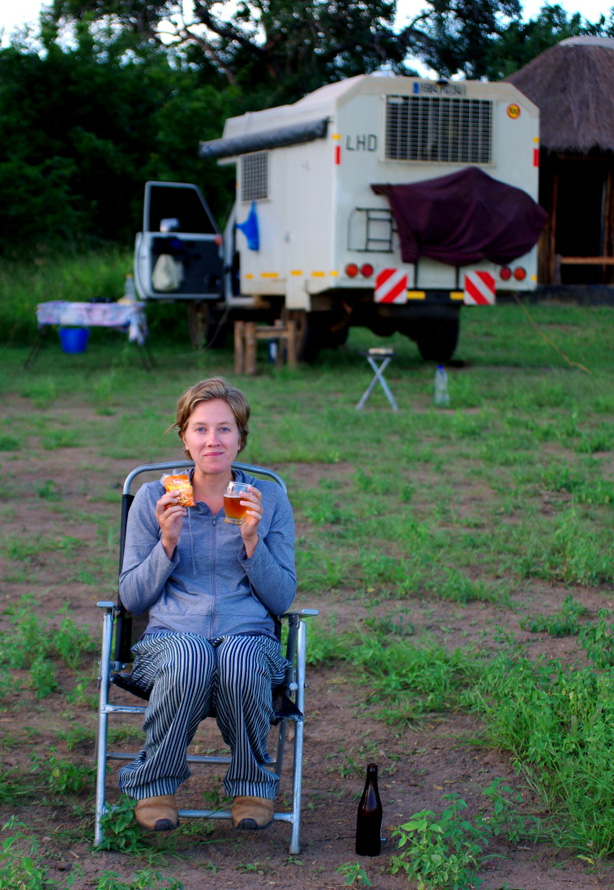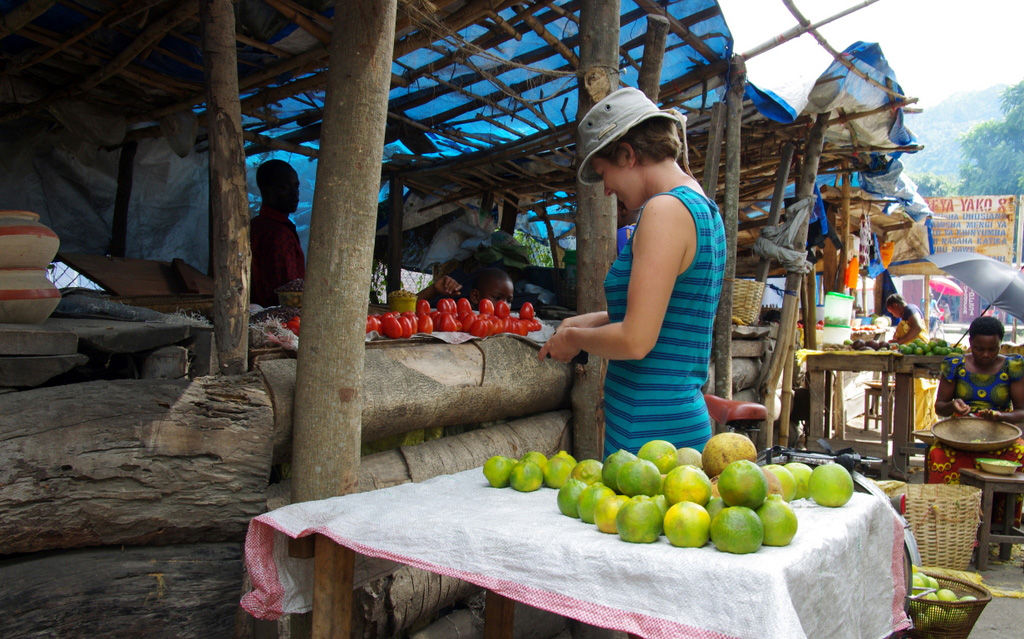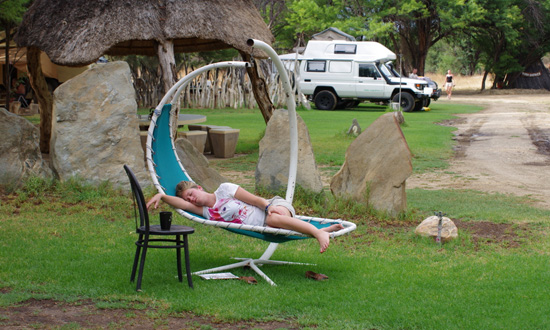How To Avoid Getting Sick Abroad


A family of six I know recently spent four months traveling overland through West Africa. Within a month, five out of the six of them had contracted malaria. A mere month later, half had relapsed into malarial fevers, with the eldest daughter also developing typhoid fever and hepatitis B back-to-back.
This is the exception I assure you, and not the rule.
With almost a solid decade of African, Asian, and South American travel under my belt, and only one serious illness to show for it, I am proof that it is much harder to fall ill than your doctor or guidebook suggests. Here are my reasons.
How I Avoid Getting Sick Abroad
Proof #1: I Don’t Take Malaria Medication

- Brittany’s method of protection against malaria? Covering up in the evening.
For three years now, I have been living and traveling in regions of Africa where malaria poses a serious risk. I have chosen not to take anti-malarial prophylactics for two reasons. First, when I took it for four months while studying abroad in Senegal it made me feel mildly ill throughout; and second, taking this medication long-term is worse for your health than actually getting malaria.
I don’t use a mosquito net or bug spray, either. What’s my method of protection? Covering up in the evening. And despite this rudimentary defense, I haven’t contracted malaria (knock on wood).
Proof #2: I Swim in Infested Waters
The three Great Lakes of Africa – Victoria, Malawi, and Tanganyika – are notorious for being rife with bilharzia. In the past year, I swam in all three, and have logged most of my swimming hours in Lake Malawi, where the risk of bilharzia is greatest. I avoid swimming in the dirty water of big cities and in pools of stagnant water, but otherwise, I bathe where locals bathe. And I am happy to report that I remain bilharzia-free.
Proof #3: I Eat What I Want to Eat

- Brittany rinses produce she bought from a market in water with a touch of bleach.
The old travel adage, “peel it, boil it, cook it or toss it” doesn’t bode well with me. As a vegetarian/health-freak/food-connoisseur who loves fresh strawberries and tossed salads, I refuse to limit my diet to cooked vegetables and a few peel-able fruits. Instead, after visiting the local market I rinse my produce in water with a touch of bleach, which supposedly kills harmful bacteria.
I also eat in sketchy, dirty local restaurants. I can’t help it. The food tastes great, and the atmosphere is even better. Sure, I’ve had periodic bouts of mildly upset stomach, but what traveler hasn’t? Getting to eat what I want is worth a little tummy ache from time to time.
[Semi] Proof #4: I Drink Local Water

- Brittany uses a portable water filter to pump local water clean.
Rather than buying expensive and polluting plastic bottles of mineral water, I use a portable water filter (Katadyn, a reputable Swiss brand) to pump local water clean.
I haven’t always been so careful, however. I used to drink unfiltered tap water. If the local people drank the water, I drank it. If it looked clear and tasted fine, I gulped it down worry-free. And in most cases, this approach worked just fine. Ironically, it was while living on a farm in Zimbabwe, where I’d drunk the borehole (deep well) water for over a year without problems, that I fell sick.
Giardiasis is a nasty illness that left me nauseous, bloated, gassy, feverish, and weak for five whole weeks.
It turned out that a carcass of a dead animal had fallen into the borehole and infected the water with the parasite that made me so sick I even contemplated flying home to Canada. Then I found out that giardiasis is present even in Canada. That put things into perspective for me.
And, all that is this point of me advertising my health triumphs and failures over the World Wide Web. It’s not to boast (and it’s certainly not to worry my mother – I’m fine, Mom!). It’s to put things into perspective. Health risks are everywhere, even in places we deem safe. Even in our own hometowns. And, falling ill with yellow or dengue fever, malaria, or bilharzia, is harder than you think. My own record of carelessness during a decade of constant travel surely illustrates that.
So go! Travel! Take the leap out into the wide world! Take reasonable precautions yes, but don’t let paranoia or fear of exotic diseases prevent you from seeing the world.
Top photo by Unsplash.









Brittany, You’re lucky, and fortunate to have a healthy constitution.
I suppose I am, Judith. Last night, I was re-reading my blog posts from my very first trips abroad, and, though I had forgotten, I often mentioned a mildly upset stomach. Later, when I was living in Nepal, I remember putting myself through some very risky stomach tests, like eating “pani puri” on the street (a tasty snack filled with dirty water). I think I got my stomach of steel by pushing my boundaries slowly but surely while traveling. I’m lucky to have the time to do so, as I rarely travel on short-term holidays, so I can afford to pick up mild illnesses here and there.
Thanks for your comment, Patricia. Just want to add to what you said/ A lot of long-term travelers I meet (as well as my own husband) have had malaria at some point during their journey to Africa. It’s sad to say, but because Westerners generally have stronger and healthier bodies, and money to access medical help, we almost always recover from malaria. For that reason, it definitely seems better not to take the prophylactic as a preventative, and leave it for the time where, God-forbid, we acquire the actual illness.
I completely agree with you Brittany. It is so true that the medical and pharmatheutical industry freaks us out with so many precautions to take just to sell vaccines and medicines but yet the remedy could be worse tan the illness itself! Not only taking malarone can be extremelly poisonous for your body, moreover many people who take it do get malaria anyway!
What I have learned in my travels is that what doesn´t kills you makes you stronger, and you´ll end up developing immunity to all these diseases just like locals do.
Thank you, M, for your comment, particularly because it allows me to clearly reiterate the message of my article: that we musn’t let our fear of exotic disease stop us from following our dreams of seeing the world. I do not suggest that travelers follow my record of careless behavior (indeed the original article title was “Health Stats of a Careless Traveler,” thereby acknowledging that I have been somewhat reckless ), but simply wish to illustrate that becoming ill is not as easy as people believe, and not necessarily easier than illness at home.
This advice, particularly around malaria and bilharzia/schisto is frankly dangerous. Sure, it may be “harder to get than you think” but I am guessing you are not an epidemiologist or a doctor. You recommend not sleeping under a bednet! That is seriously disturbing. Fine if you don’t want to take a chemical prophylaxis (I have lived in malaria zones for years and don’t), but a bednet? Give me a break. So happy for you that you haven’t fallen ill (yet), but advising this to other people is so irresponsible.